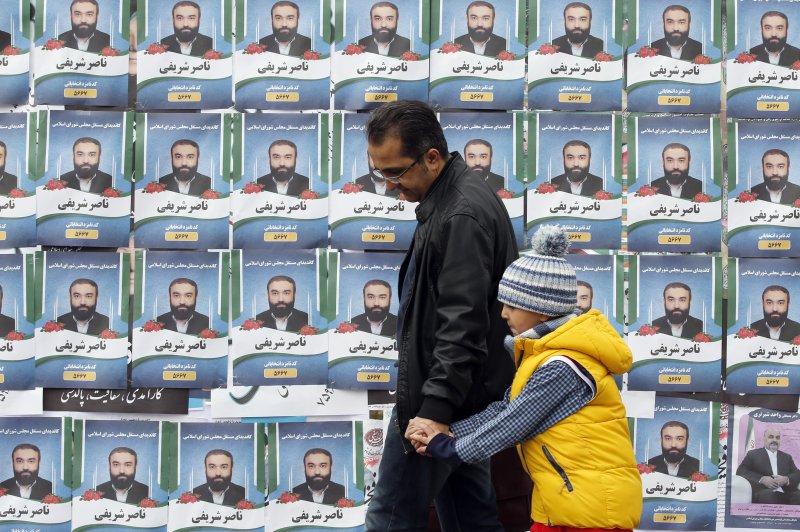Iranians walk past electoral posters during the last day of election campaign on Wednesday in Tehran. Voters will go to the polls on Friday. Photo by Abedin Taherkenareh/EPA-EFE
Feb. 20 (UPI) -- When it was first reported that Iranian authorities were purging hundreds of political candidates, including more than 90 incumbents, from this week's parliamentary elections, President Hassan Rouhani responded by saying that the move posed a threat to democracy.
But his outrage was short-lived, ending as soon as it became clear that Iranians were poised to take it seriously and impose consequences on the regime for its suppressive ways.
Since then, Rouhani has been in lockstep with supreme leader Ali Khamenei in their appeals for widespread participation in the election -- a contest that Rouhani's faction is preordained to lose. Practically all the candidates who were purged from the ballot were categorized as "reformists."
Traditionally, both factions of Iranian politics have used national elections as a means of establishing a power-sharing arrangement. It is a system that has long injected an illusion of choice and self-determination into Iran's domestic affairs. Though this year's purge of challengers was unusual in terms of its scope and singular focus, a similar phenomenon occurs each election cycle.
But this time may be different. Iranians have grown increasingly frustrated with the mostly meaningless shuffle of pre-approved candidates ordained as eligible to run and are insisting on more than the veneer of choice.
Before every election, each candidate must be vetted by several government institutions, culminating in a final approval by the Guardian Council. The body -- which is explicitly tasked with vetting all candidates to high office, as well as all legislation that passes the parliament, for compatibility with the Iranian constitution, Islamic law and the will of Khamenei himself -- is comprised of six clerics (who are appointed by the supreme leader), plus six jurists (who are appointed by the head of the judiciary, who in turn is appointed by the supreme leader).
Opponents of the clerical regime have long observed that Iran's elections are effectively meaningless. The leading Iranian opposition group, the People's Mojahedin Organization of Iran (PMOI/MEK), for instance, fervently objected to the way many Western media outlets treated Rouhani at the time of his election in 2013. While blind optimists speculated that Rouhani would be an instrument of reform within the regime, the MEK correctly predicted that nothing would change so long as the clerical regime was left intact.
Not only has Iran failed to meaningfully re-engage with the international community during Rouhani's seven-year tenure, the regime's domestic and regional behavior has grown worse. And though Western powers have been slow to acknowledge their naivete in ever trusting Rouhani, the people of Iran have been much quicker to dismiss his reformist platform as a series of empty promises.
Frustration with Rouhani culminated in a massive boycott of the polls at the time of his re-election in 2017. And although Rouhani easily won over his ultra-hard-line challenger, the entire regime was left reeling from the awareness that its legitimacy had been openly challenged. That message was further amplified by the massive boycott driven in large part by the MEK, whose "resistance units" had painted graffiti and placed posters urging people to "vote for regime change" and depicting Maryam Rajavi, the president-elect of National Council of Resistance of Iran, as a viable alternative to the established leadership.
Authorities attempted to deny the appeal of this message by reporting inflated participation numbers for that year's elections and by dispatching members of the Bassij civilian militias to make polling places look busy on state media. But the reality became undeniable by January 2018 when many of the same people who had participated in the boycott poured into the streets for mass protests against the ruling theocracy.
With slogans like "death to the dictator" and "death to Rouhani" condemning both the "hard-line" and "reformist" factions, participants in those protests made it absolutely clear that they wanted a complete change of government, in line with Rajavi's promise of free and fair elections. The nationwide uprising continued through much of 2018.
The situation became even more challenging last year when another nationwide uprising broke out in response to the government's announcement of a sharp increase in gasoline prices. Once again, widespread demands for regime change emerged, and this time the regime responded with some of the worst political violence Iran has seen since the 1980s. About 1,500 people were killed by regime authorities during November and December alone.
Although that crackdown left deep scars on the Iranian public, it also exposed the regime's Achilles' heel -- widespread and growing public rejection of a plainly anti-democratic political system.
This election season, Rajavi not only called on the Iranian people to boycott the sham elections but observed that during the recent uprisings the people and students chanted "death to Khamenei, death to the dictator, death to the oppressor, be it the shah or the leader," demonstrating that they want a future without a monarchy r the mullahs. The Iranian people want a secular republic based on democracy and people's sovereignty.
In recent weeks, graffiti has once again appeared on the streets of Tehran and other major cities proclaiming, "my vote is for regime change," a phrase that has been trending on Iranian social media.
The widespread discontent on the Iranian street is an almost sure sign of forthcoming boycotts in this week's parliamentary elections, and it is all but certain that the boycotts will be followed in time by another upsurge in public protests and continued calls for regime change by the Iranian people.
Professor Ivan Sascha Sheehan is the executive director of the School of Public and International Affairs at the University of Baltimore. Follow him on Twitter @ProfSheehan.















